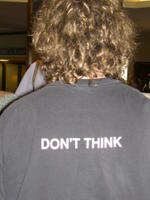
Wow, what a long day! We arrived last night from Vancouver after a day of travel. Today I attended two 4-hour tutorials, Word Sense Disambiguation and Pyro; both were very enjoyable, but long. I am especially interested in the first subject as I am currently working on a project to assign semantic orientation to adjectives. Rada Mihalcea from the University of Northern Texas was joined by Ted Peterson from U of Minnesota to give a general overview of the methods, problems, and suggested solutions to the problem of word sense disambiguation. I found this presentation to be a very good review of my CMPT 413 Natural Language Processing course at SFU, adding a bit more detail in knowledge based methods. I was quite excited to see my prof’s name cited in one of the slides on co-training in minimally supervised methods: “Statistical Parsing (Sarkar, 2001)”.
For those of you not familiar with NLP there are three basic approaches to analyzing data. The knowledge-based approach uses knowledge like dictionaries to help find meaning in raw data. Supervised approaches use human annotated data in conjunction with dictionaries while unsupervised approaches use neither a dictionary nor annotated data, but rather look at the raw text to find similarity between contexts (this is indeed real intelligence).
After the tutorials we mingled in the lobby trying to set up wireless access (which works much better now). I found this guy with the most appalling t-shirt. It turned out that he was part of a big group of people from UMBC. They seemed to be more in touch with the Pittsburgh scene than my partners and I, so Geoff, Michael and I tagged on to there plan for dinner at the Seventh Avenue Grille. The beer was flat, pasta portions a bit too small, but my Chicken with Cherry Sauce was quite yummy.
Until tomorrow,
Caroline


0 Comments:
Post a Comment
<< Home